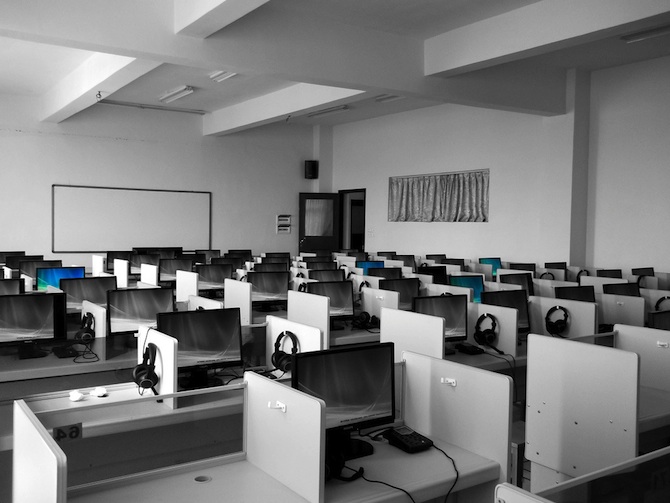Stop the Madness of Blindly Dumping Technology into Classrooms
Beyond the shiny tools, it takes courageous leadership and solid planning to provoke the deep meaningful change that we want for our students.
Please, let’s get passed the useless debate about whether or not we should have technology in school. It must become the norm. No question. Kids are extremely plugged-in and engaged outside the classroom while increasingly, they’re tuning out in the classroom. If the purpose of education is to prepare these children for today’s world, we’re already behind the eight ball.

If you’re facing the challenge of making significant and sound technology investments for your schools, but to simply replicate old practice, don’t do it. It’s a monumental waste of money. I’ve referred before to Seymour Papert’s drawing of a stagecoach equipped with rocket boosters to illustrate the point that “Technology being applied to an old model of learning and teaching simply doesn’t work.” There are too many educators who still think that if we keep refurbishing the stagecoach, we’ll prepare students for what they need to learn to thrive in this world. No more tweaking please! Let’s just stop the tweaking.
If you’re investing in technology to transform learning, there is an international group of educators converging on Atlanta in a couple of weeks this Dec 2-3 that can help you to truly make a difference for your students. Those of us who will be sharing our stories in Atlanta wear the battle scars of lessons learned from a legacy of classroom technology integration initiatives riddled with failure – because we worked in isolation without the benefit of learning from the successes and challenges of like-minded trailblazers. Don’t repeat the mistakes of the past and don’t think that you can do it alone. A community is waiting.
This event provides an opportunity for you to learn from an internationally renowned group of tech integration specialists such as Argentinean author and entrepreneur Alicia Banuelos (@aliciabanuelos) who will share her story of how she carried out her master plan to put all of the kids of San Luis online; Gary Stager (@garystager) is a tireless innovator and provocative speaker who will share his stories of working with hundreds of 1:1 schools around the world; the One-to-One Institute’s Leslie Wilson (@leslieawilson) and Mike Gleniak (@mgielniak) are the driving force behind the Project Red Signature Districts throughout the U.S. and have a wealth of insights and expertise to share.
Join a strong contingent of Canadian educators who will be showcasing how they’re pushing the boundaries of classroom change, such as Pierre Poulin from Montreal’s Commission scolaire de la Pointe-de-l’Île (@ppoulin), Mark Carbone from the Waterloo Region District School Board (@markwcarbone), Peter Katsionis from the Vancouver School Board (@pkatsblended), and many more.
This is inspirational learning that is worth clearing your calendar for on Dec 2-3. View the impressive program here.
We have the privilege of working with educators from all over the world who are developing exciting programs – with tremendous transformative potential – that are rarely scaled up. Brilliant well-intentioned leaders are pushing the edges of innovation in their schools by leveraging the potential of technology to enhance learning, but they are isolated from one another in a system that steadfastly values conformity, compliance, and control over creativity, risk-taking, and critical thinking.
Collectively, we must forge ahead, but those of us who are striving to transform classroom learning by effectively deploying technology are still butting heads with many pundits who argue that there is too much financial risk associated with district-wide technology integration. The real risk is continuing to prepare our students for a rapidly changing world using pen and paper. It is 2013. We’re well into an established call to action for ‘21st century learning’, but we’re still paying more lip service to the term than delivering concrete results. We can’t keep preparing our kids for 1991. It is nothing less than malpractice.
Please note that CEA’s Atlanta event partners (One-to-One Institute and Lausanne Learning Institute) have previously distributed portions of this blog post